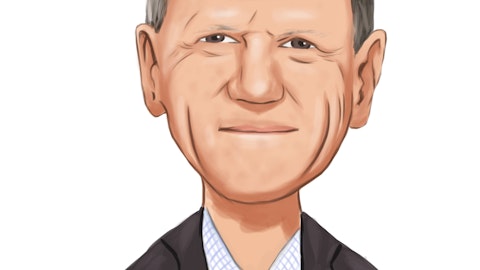Operator: Our next question will come from Wes Golladay with Baird.
Wesley Golladay: I just wanted to follow up on the plan for Genesis. It looks like you have some action to re-lease the space, but maybe talk about your long-term plans for this asset? Would it be to lease it up and sell it? And just curious if this was part of a bigger deal, and if that’s how you got the back-office space in the first place?
David Dupuy: Wes, thanks for the question. Yes, it is. So we — this was a portfolio acquisition that the company made, I think, in the December timeframe of 2020. And so, as part of a portfolio, sometimes you get an asset that you wouldn’t ordinarily go after if it was a single asset, and that is the case related to the asset in Fort Myers. And so yes, I mean, look, we’re not — our focus as a firm is going after health care-related provision of health care assets. I think everyone knows that, that’s the focus of our business. And so, ultimately, if Fort Myers doesn’t fit that, long term, we might look to sell that property. All options are on the table. We’re — like I said, we’re experiencing some good activity at both locations, and although good activity doesn’t necessarily translate into a lease right away, we feel good that both are attractive in their respective markets.
And so, ultimately, we hope to get those re-leased right away. But yes, I mean, back-office space for health care providers is not a focus for the firm, and we wouldn’t have done that acquisition if it wasn’t a part of a larger transaction.
Wesley Golladay: Got it. Yes, that all makes sense. The — I guess, how have your conversations changed with potential sellers with the recent rise in interest rates? Have they changed at all?
David Dupuy: Yes, listen, from an activity standpoint, it’s been great. I mean, we’re seeing a lot more activity in the marketplace. Capital is precious, as everybody knows on this call, and so it’s very precious for us, too. We feel good about the dialogue and the activity that we’re having with potential sellers. We think that, that activity is going to translate into some good acquisition opportunities, but yes, I think we’re seeing really solid activity on both sides of our business. As most people know, we’re looking both at assets that are represented in the brokerage market, but we’re also having good dialogue with potential client companies. And even though those conversations haven’t resulted in specific purchase and sale agreements today, we feel like that good dialogue bodes well going forward for us from an acquisition standpoint.
So even though — and really because rates are so high, to the extent we had competition from smaller buyers, whether they be 1031 exchange buyers or other smaller real estate funds, obviously, it’s tougher for those funds and for those buyers to get financing in this environment. And as an all-cash buyer, we feel like we’ve got a pretty nice advantage in the marketplace right now, and it’s allowed us to be choosy, and we’re seeing a lot of good opportunities.
Wesley Golladay: Got it. And can you give a clarification. When you set the cap rates, they always have a typical range, is this due to nondisclosure reasons, or is there something that can actually change the actual cap rate at the time of the deal is finally closed?
David Dupuy: Yes. I mean, I think that’s — what are you referring to specifically, Wes?
Wesley Golladay: Would you give a range on cap rates? You kind of give, we have this many deals, $166 million at this range for the cap rate instead of like a pinpoint — like if the deal not — or the term is not officially set? Or is there a reason you can’t disclose? Maybe the seller doesn’t want you to give the official cap rate? Just trying to see what kind of can cause the variation between the range you give?




